Berkeley
We Must Build Our Greatest Strength: Diversity
By Benjamin
Todd Jealous
“For a country regarded as the paramount leader in a multicultural world, the United States has yet to embrace its own diversity; continuing failure to do so will have profound consequences for governance.”
That quote came from a 1996 report by Allan E. Goodman, former executive dean at the Georgetown School of Foreign Service. For decades, American leaders in business, education and economics have lamented the wide racial and ethnic gaps in our education system.
Last week’s Supreme Court ruling on affirmative action reminded us that we have a long way to go.
In the case of Fisher v. Texas, the Supreme Court ruled on the constitutionality of the University of Texas’ admissions policy. The university currently allows admissions officers to consider an applicant’s race among a number of other qualifying factors.
The Court voted to send the case back to a lower court of appeals. In doing so, they reaffirmed the use of race in admissions, and the importance of educational diversity in the 21st Century.
The decision in Fisher upheld an important precedent set in the 2003 case of Gruttinger v. Bollinger. In that case, Justice Sandra Day O’Connor refuted the idea that our society had advanced beyond affirmative action.
She argued that the need for “cross-racial understanding” was still necessary to break down racial stereotypes, and that “student body diversity is a compelling state interest.”
Justice O’Connor’s argument was based on sound social research. In her words, “major American businesses have made clear that the skills needed in today’s increasingly global marketplace can only be developed through exposure to widely diverse people, cultures, ideas, and viewpoints.”
Like Allan Goodman, Justice O’Connor also saw diversity as a national interest.
This is even truer today. When Goodman wrote about the multicultural world in 1996, only one out of every 13 Americans had access to the Internet. Google, Twitter and Facebook were still rough ideas scribbled in students’ sketchpads.
Seventeen years later, technological advances in communications, travel and trade have given rise to a new era of globalization. Leaders in business and government need to know how to work with people of vastly different races, cultures and perspectives.
We will be stronger as a nation if we embrace our growing diversity and ensure that the pathways to leadership remain wide open. Numerous studies reveal that mere interaction is the best way to avoid intergroup conflict. Sociologists have even found that diversity increases opportunities for creativity.
In light of the Supreme Court’s decision, America’s educational institutions should recommit to fair and thoughtful ways to foster diversity. In the coming months, the NAACP will work with universities, policymakers, and the business community to see that qualified students from a diversity of backgrounds get a close look and a fair shot at admission to top schools.
Justice O’Connor wrote that “effective participation by members of all racial and ethnic groups in the civic life of our Nation is essential if the dream of one Nation, indivisible, is to be realized.”
Our country’s pledge is to be one nation, and our country’s challenge is to lead a global economy that is increasingly flat. If America is to maintain its role as a moral and economic leader in the 21st Century, we must build on our greatest strength: diversity.
Ben Jealous is president/CEO of the NAACP.
Activism
South African Solidarity Committee Hosts 31st Annual Celebration
“We’re all together for each other celebrating 31 years of building international solidarity between the people of the United States and South Africa toward the implementation of the 1955 Freedom Charter and 2030 Sustainable Development Goals,” said COSAS Operations Manager Nicole Richards.Located in Berkeley, COSAS is dedicated to the continuing struggle by the people of South Africa’s need for independence.
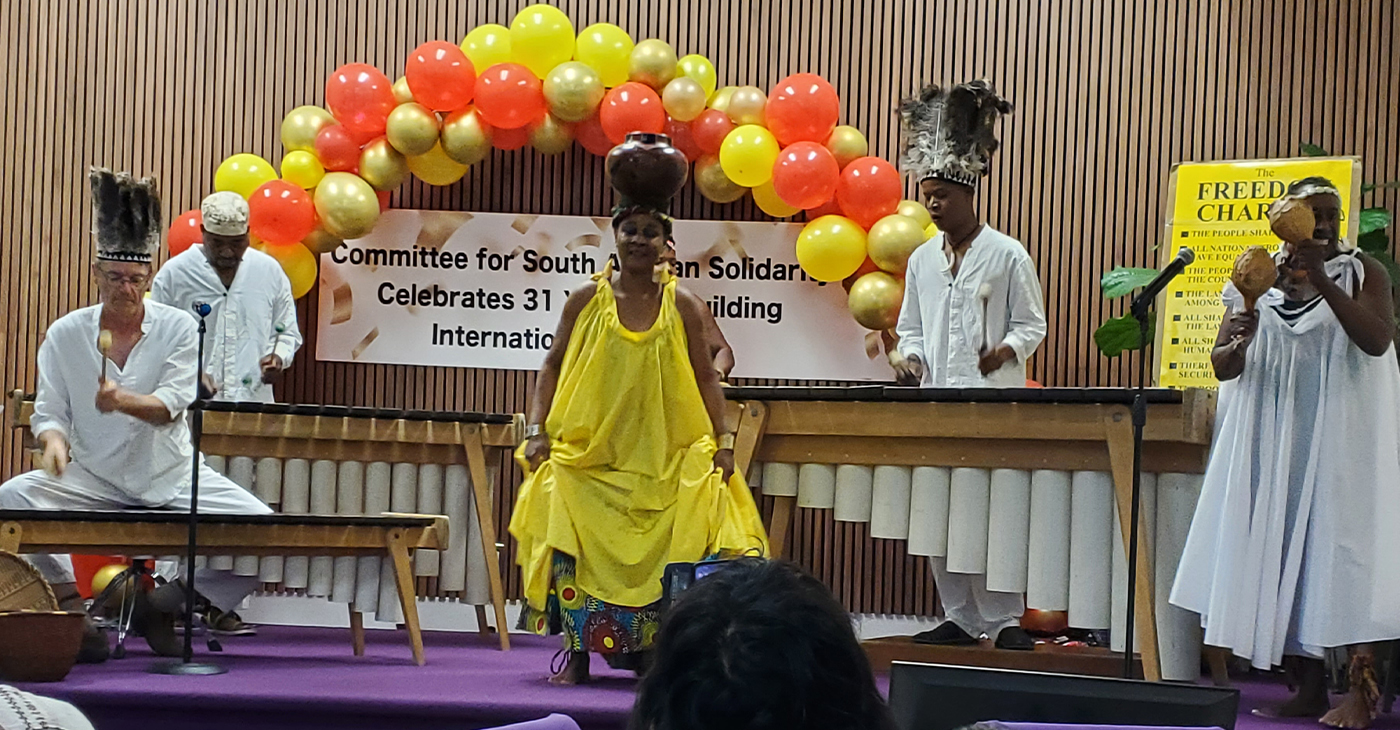
By Carla Thomas
The Committee of South African Solidarity (COSAS) celebrated its 31st anniversary on Saturday, Oct. 26 at the East Bay Church of Religious Science in Oakland.
Themed “Ubuntu,” a word in Zulu and Xhosa, which means “I am because we are,” the event brought together supporters and community members.
“We’re all together for each other celebrating 31 years of building international solidarity between the people of the United States and South Africa toward the implementation of the 1955 Freedom Charter and 2030 Sustainable Development Goals,” said COSAS Operations Manager Nicole Richards.
Located in Berkeley, COSAS is dedicated to the continuing struggle by the people of South Africa’s need for independence.
A soulful meal was prepared by Chef Rene Johnson and Blackberry Soul Catering along with live entertainment and speakers.
COSAS is an all-volunteer, private membership organization, made up of South Africans, Africans, students, professionals, clergy and others committed to building solidarity between the working people of the U.S. and the South African people still struggling for economic and political freedom.
Formed in 1993, the organization promotes the “real nature” of the changes and struggles taking place in South Africa and the African continent, according to Richards.
“COSAS counters ‘disinformation’ and ‘misinformation’ in the U.S. and Western mainstream media that creates division and distrust,” Richards said. “We produce the South African Beacon and organize and transport solidarity shipments of school supplies to South African grade schools requesting assistance,” Richards said.
According to organizers, COSAS is completely run by volunteers, free from the corporate and government agendas that continue to keep South Africa dependent on the West.
“We rely on the support of concerned individuals. Call us today about how you can get involved by sorting and packing supplies, donating office equipment, and supporting special events,” said Richards.
Earlier in the year, COSAS hosted its World Affairs film showing at Downs Memorial United Methodist Church. The screening featured a short film, “Feeding a Crisis: Africa’s Manufactured Hunger Pandemic,” exploring the hunger challenges African countries face and approaches to resolving the issues.
Contact the Committee for South African Solidarity, 1837 Alcatraz Ave., Berkeley, CA, 510-251-0998 for volunteer opportunities and event information.
Activism
‘Jim Crow Was and Remains Real in Alameda County (and) It Is What We Are Challenging and Trying to Fix Every Day,’ Says D.A. Pamela Price
“The legacy of Jim Crow is not just a legacy in Alameda County. It’s real. It is what is happening and how (the system is) operating, and that is what we are challenging and trying to fix every day,” said D.A. Price, speaking to the Oakland Post by telephone for over an hour last Saturday. “Racial disparities in this county have never been effectively eliminated, and we are applying and training our lawyers on the (state’s) Racial Justice Act, and we’re implementing it in Alameda County every day,” she said.

By Ken Epstein
Part One
Alameda County District Attorney Pamela Price gave an exclusive in-depth interview, speaking with the Oakland Post about the continuing legacy of Jim Crow injustice that she is working to overturn and her major achievements, including:
- restoring and expanding services for victims of crime,
- finding funding for an alternative to incarceration and/or prosecution for substance use and mental health-related misdemeanors and
- aggressively prosecuting corporations for toxic pollution and consumer violations.
“The legacy of Jim Crow is not just a legacy in Alameda County. It’s real. It is what is happening and how (the system is) operating, and that is what we are challenging and trying to fix every day,” said D.A. Price, speaking to the Oakland Post by telephone for over an hour last Saturday.
“Racial disparities in this county have never been effectively eliminated, and we are applying and training our lawyers on the (state’s) Racial Justice Act, and we’re implementing it in Alameda County every day,” she said.
Passed by the State Legislature, this law “is an extremely helpful tool for us to address the racial disparities that continue to exist in our system,” she said.
(The law addresses) “the racial disparities that we find in our juvenile justice system, where 86% of all felony juvenile arrests in the county are Black or Brown children.
“We trained the entire workforce on the Racial Justice Act. We are creating a data system that will allow us to look at the trends and to clearly identify where racism has infected the process. We know that where law enforcement is still engaging in racial profiling and unfair targeting and arresting, we’re trying to make sure we’re catching that.”
Many people do not know much about the magnitude of Alameda County District Attorney’s job. Her office is a sprawling organization with 10 offices serving 1.6 million people living in 14 cities and six unincorporated areas, with a budget this year of about $104 million.
Asked about her major achievements since she took office last year, she is especially proud of the expanded and renewed victims’ services division in the DA’s Office, she said.
“We have expanded and reorganized the entire claims division so that we are now expediting as much as possible the benefits that victims are entitled to. Under my predecessor, they were having to wait anywhere, sometimes as long as a year, to 400 days to get benefits.
“Claims had been denied that should not have been denied. So, we’re helping people file appeals on claims that were denied under her tenure,” D.A. Price said.
“Under my predecessor, (the victims’ service office) was staffed by people who were not trained to provide trauma-informed services to victims, and yet they were the only people that the victims were in contact with. We immediately stopped that practice,” she continued.
“We had to expand the advocate workforce to include people who speak Hmong, the indigenous language of so many people in this county who are victims of crime.”
More African Americans advocates were hired because they represent the largest percentage of crime victims and we hired a transgender advocate and advocates who speak Cantonese and Mandarin. “The predominantly Chinese American community in Oakland was not being served by advocates who speak the language,” said D Price
“We reduced the lag time from the delivery of benefits to victims from 300 to 400 days down to less than 60 days.”
She increased victim advocacy by 38%, providing critical support to over 22,500 victims, a key component of community safety.
Other major achievements:
- She recently filed 12 felony charges against a man accused of multiple armed robberies, demonstrating her seriousness about prosecuting violent crimes
- In October, a jury delivered a guilty verdict in the double murder trial of former Alameda County Sheriff’s Deputy Devin Williams, showing DA Price’s commitment to holding law enforcement accountable.
- She recently charged a man and woman in unincorporated San Leandro with murder, felony unlawful firearm activity, and felony carrying a loaded firearm in public.
- A. Price’s office was awarded a $6 million grant by the state for its CARES Navigation Center diversion program. In partnership with the UnCuffed Project at a Seventh Day Adventist Church in Oakland, the program provides resources and referrals for services to residents as an alternative to incarceration and/or prosecution for substance use and mental health-related misdemeanors.
“This is the largest grant investment in the history of the Alameda County District Attorney’s Office,” said D.A. Price.
She explained that the program now has a mobile unit. “We have washers and dryers. We have a living room. We have a television. It’s a place where people can decompress, get themselves stabilized,” she said.
The project has “the ability to refer people to housing, to more long-term mental health services, to social services, and to assist them in other ways.”
- Her office joined in a $49 million statewide settlement with Kaiser Health Plan and Hospitals, resolving allegations that the healthcare provider unlawfully disposed of hazardous waste, medical waste, and protected health information. The settlement, which involved the state and a half dozen counties, resulted in Alameda County receiving $7 million for its residents.
- DA Price charged a former trucking company employee for embezzling over $4.3 million, showing her commitment to tackling white-collar crime.
- For the first time, Alameda County won a criminal grand jury indictment of a major corporation with two corporate officers that have been sources of pollution. “They had a record of settlements and pollution in this community, and they had a fire that constituted a grave danger,” she said.
Attorney Walter Riley contributed to this article.
Activism
“Two things can be true at once.” An Afro-Latina Voter Weighs in on Identity and Politics
“As a Puerto Rican I do not feel spoken to in discussions about Latino voters… which is ironic because we are one of the few Latino communities who are also simultaneously American,” Ortiz-Cedeño says. Puerto Ricans born in Puerto Rico, a U.S. territory, have American citizenship by birth but they do not have the right to vote for president if they live on the island. “I think that we miss out on a really interesting opportunity to have a nuanced conversation by ignoring this huge Latino population that is indigenously American.”
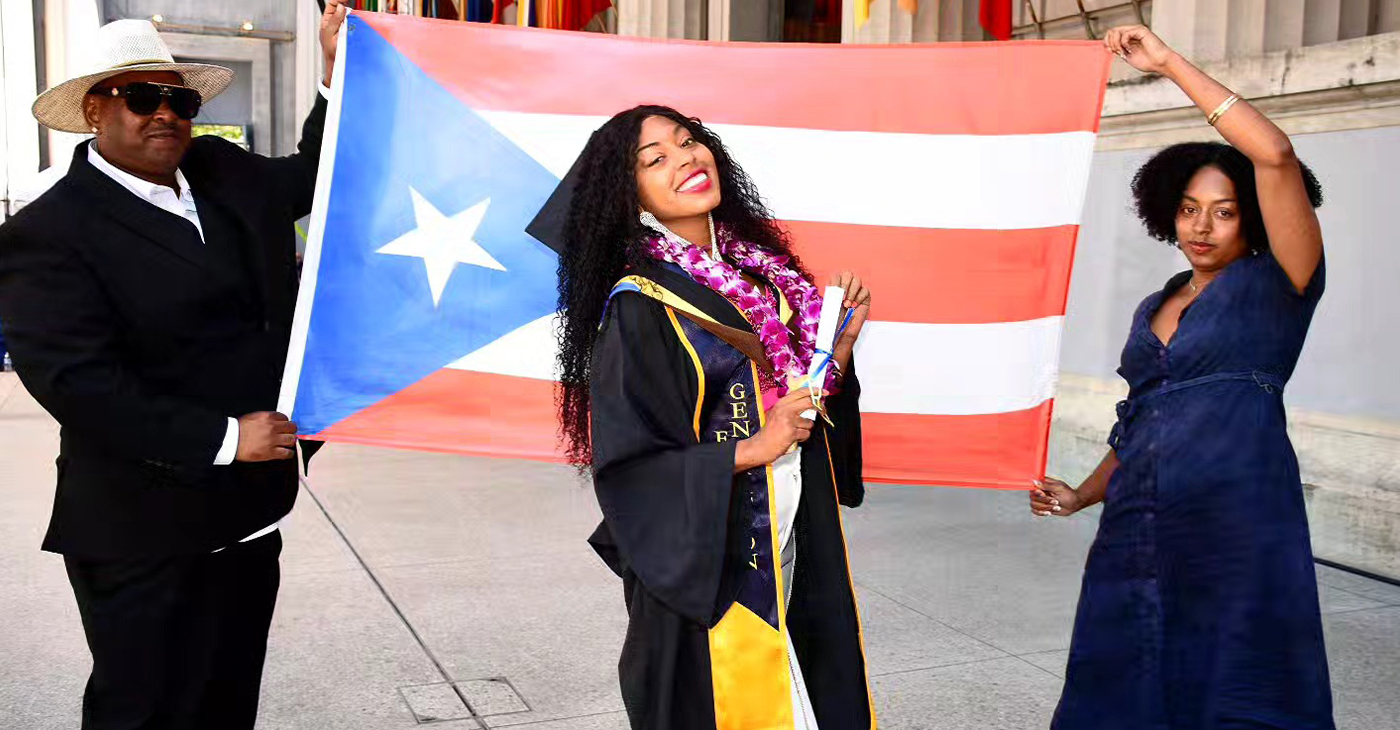
By Magaly Muñoz
On a sunny afternoon at Los Cilantros Restaurant in Berkeley, California, Keyanna Ortiz-Cedeño, a 27-year-old Afro-Latina with tight curly hair and deep brown skin, stares down at her carne asada tacos, “I’ve definitely eaten more tortillas than plantains over the course of my life,” says Cedeño, who spent her childhood in South Texas, among predominantly Mexican-American Latinos. As she eats, she reflects on the views that American politicians have of Latino voters.
“As a Puerto Rican I do not feel spoken to in discussions about Latino voters… which is ironic because we are one of the few Latino communities who are also simultaneously American,” Ortiz-Cedeño says. Puerto Ricans born in Puerto Rico, a U.S. territory, have American citizenship by birth but they do not have the right to vote for president if they live on the island. “I think that we miss out on a really interesting opportunity to have a nuanced conversation by ignoring this huge Latino population that is indigenously American.”
Ortiz-Cedeño, an urban planner who is focused on disaster resilience, homelessness and economic prosperity for people of color, says that political conversations around Latinos tend to shift towards immigration, “I think this ties back into the ways that our perception of ‘Latino’ tends to be Mexican and Central American because so much of our conversation about Latinos is deeply rooted in what’s happening on the border,” she says. “I don’t think that the Afro-Latino vote is frequently considered when we’re talking about the Latino vote in the United States.”

Primarily surrounded by Mexican-Americans while growing up in South Texas, Keyanna participated in many Chicano cultured events, such as being a dama in several quinceñeras. Courtesy photo.
As Ortiz-Cedeño sifts through childhood photos of her as a happy teen dancing with the Mexican ballet folklorico group in high school and as a dama in quinceñeras, she reflects on growing up in South Texas, an area with a large population of white and Mexican-Americans. The Black population was small, and within it, the Afro-Latino population was practically nonexistent.
“It was interesting to try to have conversations with other Latinos in the community because I think that there was a combination of both willful ignorance and a sort of ill intent and effort to try and deny my experience as a Latino,” she says. “There are a lot of folks in Latin America who experience a lot of cognitive dissonance when they think about the existence of Black Latinos in Latin America.
Ortiz-Cedeño comments on the long history of anti-Blackness in Latin America. “Throughout Latin America, we have a really insidious history with erasing Blackness and I think that that has been carried into the Latino American culture and experience,” she says. “People will tell you, race doesn’t exist in Latin America, like we’re all Dominicans, we’re all Puerto Ricans, we’re all Cubans, we’re all Mexicans. If you were to go to the spaces with where people are from and look at who is experiencing the most acute violence, the most acute poverty, the most acute political oppression and marginalization, those people are usually darker. And that’s not by accident, it’s by design.”
Because of the lack of diversity in her Gulf Coast town, as a teenager, despite being the only Spanish-speaker at her job in Walmart, Latinos refused to ask for her help in Spanish.
“Even if monolingual [Spanish-speaking] people would have to speak with me, then they were trying to speak English, even though they could not speak English, versus engaging with me as a Latina,” she says.
“I think that the perception of Latinos in the United States is of a light brown person with long, wavy or straight hair. The perfect amount of curves and the perfect combination of Indigenous and white genes. And very rarely will people also consider that maybe they also have a sprinkle of Blackness in them as well,” she says. “Over 90% of the slave trade went to the Caribbean and Latin America.”
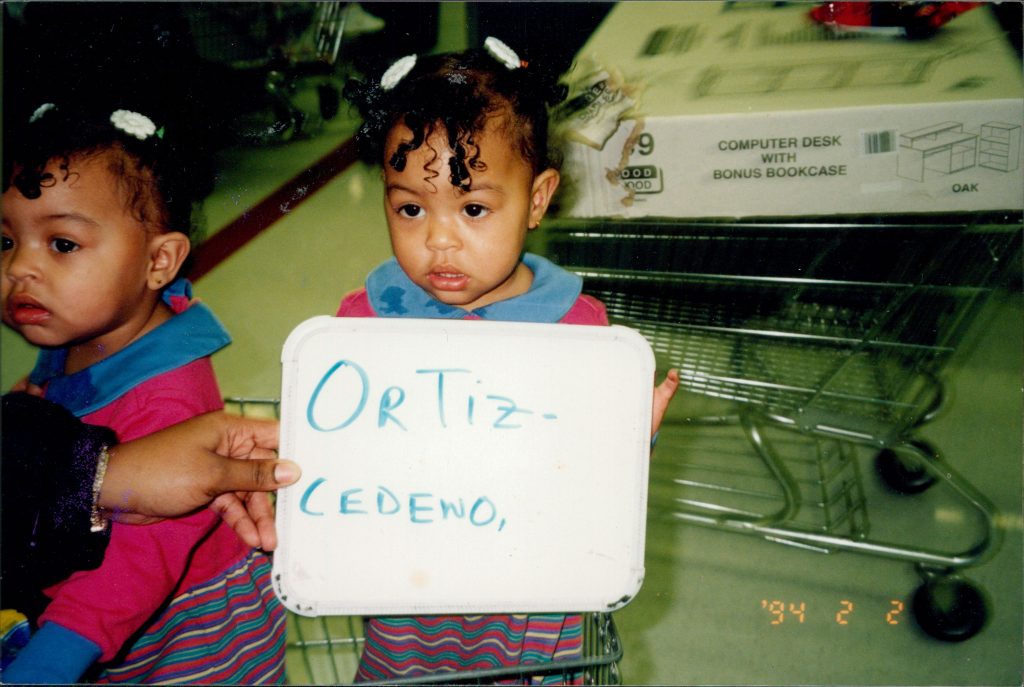
Keyanna as a toddler, holding a whiteboard up with her last name, Ortiz-Cedeño, on it. Courtesy photo.
Ortiz-Cedeño remembers when a Cuban family moved in next door to her in Texas. The teen daughter had blue-eyes, blonde hair and only spoke Spanish, which caused neighboring Latinos to take pause because she didn’t fit the Latino “look” they were used to.
“People didn’t have an option to try and negate her [Latino] identity because they had to acknowledge her for everything that she was,” Ortiz-Cedeño says.
Later on, the girl’s cousins, a Black, Spanish-speaking Cuban family, came into town and again locals were forced to reckon with the fact that not all Latinos fit a certain criteria.
“I think it forced everybody to have to confront a reality that they knew in the back of their mind but didn’t want to acknowledge at the forefront,” Ortiz-Cedeño says.
Having gone through these experiences as an Afro-Latina, Ortiz-Cedeño says it’s easy for her to understand Kamala Harris’ mixed Indian and Jamaican heritage, “It comes really naturally to accept that she is both Indian and Black. Two things can exist at the same time,” she says. “I had a long term partner for about seven years who was South Indian, from the same state as Kamala Harris, so if we had had a kid, they would look like [Harris],” Ortiz-Cedeño jokingly shares.
She says she can relate to having to walk the road of people only wanting to see Harris as a Black American. The talking point about [Harris] not being Indian or not being Black, just deciding to be Black, is really disingenuous and cheap,” she says.
Ortiz-Cedeño believes that the Harris campaign has not capitalized on the vice president’s mixed identity, which could be vital in bringing together different communities to understand each other on a new level and allow for improvements on America’s racial dynamics.

Keyanna co-managed a recovery center with her mother after Hurricane Harvey. They packed essentials, such as diapers, food, and water for families in need. Courtesy photo.
As she rushes into a Berkeley Urban Planning Commission meeting straight out of Ashby BART station, Ortiz-Cedeño explains her love for talking about all things infrastructure, homelessness, and healthcare access. The topics can be dry for many, she admits, but in the end, she gets to address long-standing systemic issues that often hinder opportunities for growth for people of color.
Having lived through the effects of Hurricane Katrina as a child, with the flooding and mass migration of Louisiana residents into Texas, Ortiz-Cedeño was radicalized into issues of displacement, emergency mitigation, and housing at nine years old.
“I remember my principal had to carry her students on her shoulders and swim us home because so many parents were trying to drive in and get their kids from school [due to] the flooding that was pushing their cars away,” she recalls.
Her family relocated to Houston soon after Katrina, only to be met with a deadly Hurricane Rita. They wound up in a mega-shelter, where Ortiz-Cedeño says she heard survivors stories of the unstable conditions in New Orleans and beyond, which got her wondering about urban planning, a term she wasn’t familiar with at the time.
“I think that when you put people in the context of the things that were happening in this country around [these hurricanes], a lot of us started to really think seriously about who gets to make decisions about the urban environment,” she adds.
Watching the heavy displacement of disaster survivors, hearing stories of her Navy veteran father’s chronic homelessness, and her own mother’s work and activism with homeless communities in the non–profit sector put her on the path to progressive politics and solutions, she says. After attending college on the East Coast- where she says she was finally recognized as a Puerto Rican- and working in housing, economic development, and public policy, she returned to California to earn a Master’s in City Regional Planning from UC Berkeley.
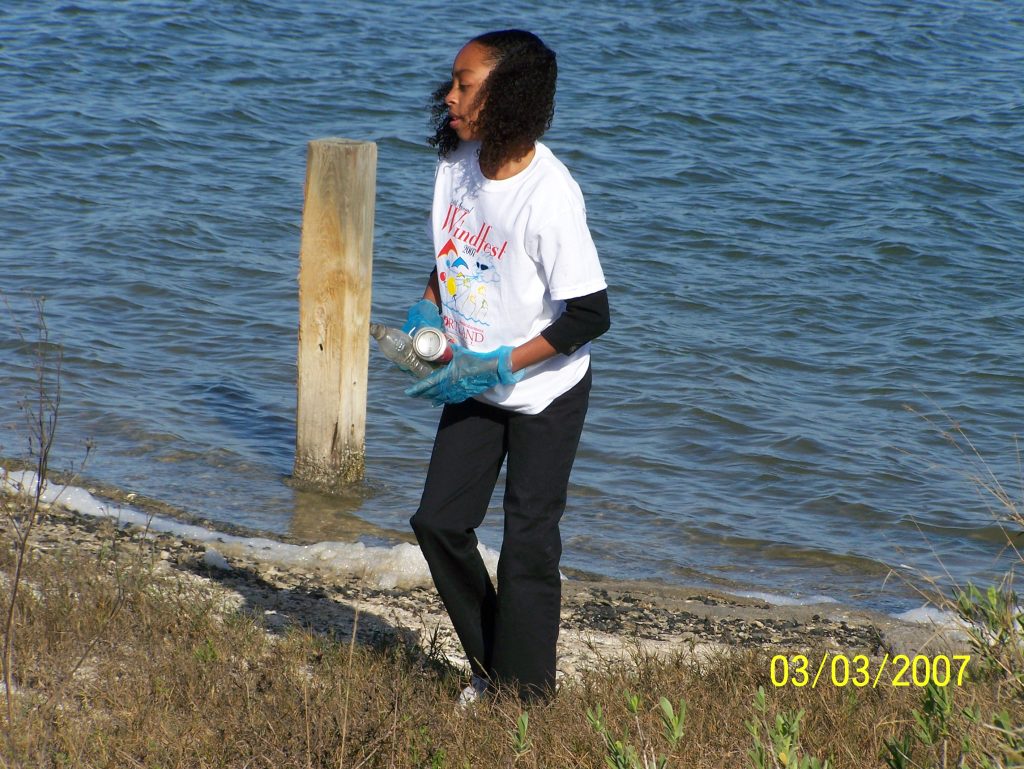
Young Keyanna volunteering at a beach clean up. Activism and giving back to her community has always been a key part of her upbringing. Courtesy photo.
Her vast interest in the urban success of underserved communities even took her abroad to Israel and Palestine when she was an undergraduate college student. “I’ve seen the border with Gaza, I’ve had homestays with farmers in the West Bank,” she says. “For me personally, Palestine is an issue that is really close to the heart.”
“I have a very intimate understanding of the conflict and I’m very disturbed by the way in which the [Democratic] party has not been willing to engage in what I would perceive to be a thoughtful enough conversation about the conflict,” Ortiz-Cedeño says. “The issue of Palestine is going to be one of those that is a make or break issue for her. It has not been one that has been taken seriously enough by the party.”
Ortiz-Cedeño is not under the illusion that one candidate will address every policy issue she wants to see tackled by the president. But she believes it’s better than what former President Donald Trump has to offer.
“Trump has made it very clear what his intentions are with Palestine, and what his relationship is with [Benjamin] Netanyahu,” Ortiz-Cedeño says. “I understand the political strategy that many people are trying to engage in by withholding their vote, but I would also encourage them to re-engage in the political process.”
Casting her vote for Harris is a decision grounded in calculation rather than outright support. “I think I can vote in this election in order to have harm reduction… because I have deep care and concern for other communities that are going to be impacted by a Trump presidency,” Ortiz-Cedeño says.
She also hopes that American politicians will consider the nuance and perspective that Afro-Latinos bring to the table when it comes to politics, policy, and race in America, “When we don’t think expansively about who is Latino in the United States, the breadth of Latino experiences in the United States, we miss an opportunity to capture how diverse Latinos interests are politically.”

This story was reported in collaboration with PBS VOCES: Latino Vote 2024.
-

 Alameda County4 weeks ago
Alameda County4 weeks agoD.A. Price Charges Coliseum Flea Market Vendors in Organized Retail Theft Case
-

 Activism3 weeks ago
Activism3 weeks agoLIVE! — TOWN HALL ON RACISM AND ITS IMPACT — THURS. 11.14.24 5PM PST
-

 Bay Area4 weeks ago
Bay Area4 weeks agoOakland Mayor Sheng Thao’s Open Letter to Philip Dreyfuss, Recall Election’s Primary Funder
-

 Bay Area4 weeks ago
Bay Area4 weeks agoPoll Shows Strong Support for California’s Controversial Prop 36 Crime Initiative
-
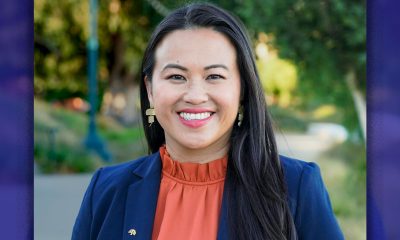
 Bay Area4 weeks ago
Bay Area4 weeks agoOakland Awarded $28 Million Grant from Governor Newsom to Sustain Long-Term Solutions Addressing Homelessness
-

 Activism3 weeks ago
Activism3 weeks agoOakland Post: Week of November 6 – 12, 2024
-

 Bay Area4 weeks ago
Bay Area4 weeks agoAlameda County Judge Blasts Defendants Over Delay in West Oakland Fire Trial
-

 Business4 weeks ago
Business4 weeks agoSacramento Kings and Black-Owned Digital License Plate Firm Enter History-Making Partnership















































